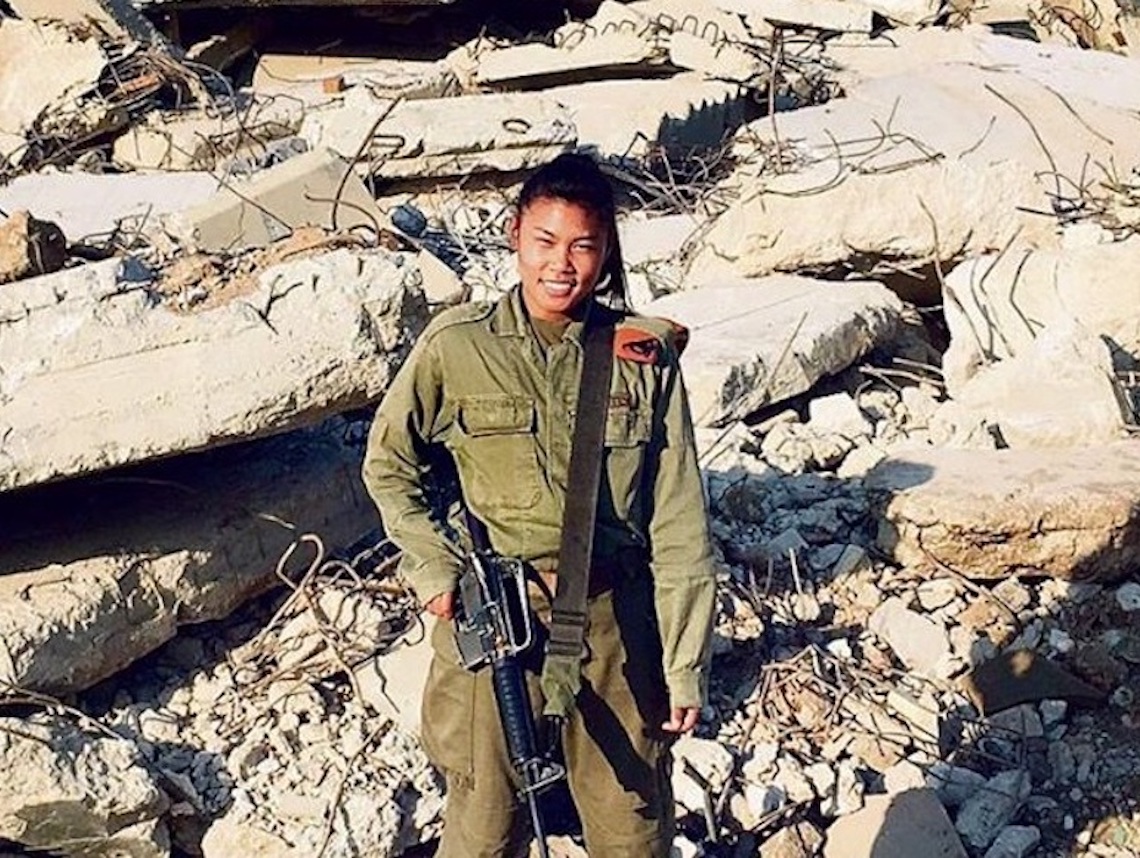 Staff Sgt. Joana Chris Arpon on Israeli soldiers saving her grandmother in the Philippines: “I was like, “Whoa, that’s what I want to do.” Photo courtesy of IDF Spokesperson
Staff Sgt. Joana Chris Arpon on Israeli soldiers saving her grandmother in the Philippines: “I was like, “Whoa, that’s what I want to do.” Photo courtesy of IDF Spokesperson GUSH ETZION, WEST BANK: Shai Segal’s phone doesn’t stop ringing.
“Is it important?” she says quickly into the phone. “OK, I’ll call you back.”
Ten seconds later the phone rings again.
“Where?” she says. “OK, we’ll check it out.”
Segal, 20, is an operations officer in the Etzion war room, responsible for an area that includes 22 Jewish settlements and dozens of Palestinian villages, as well as the Al-Aroub refugee camp. In the war room, computer screens flash the latest information and young women hunch over, talking quickly into phones.
“Our job is to know everything going on in the sector,” Segal told The Media Line. “There are areas in the sector that Palestinians are allowed to be in, and others where they’re not. For example, the Gush Etzion junction, which is the commercial area — Palestinians can’t walk there on foot. It’s something new. They can come in cars and shop, but if we see someone walking we have to stop and check [them].”
The Gush Etzion junction boasts a new mall as well as a large supermarket with Jewish and Palestinian employees. The nearby bus stop has been the site of a series of Palestinian attacks. Last week a1 16-year-old Palestinian girl tried to ram her car into soldiers guarding the bus stop. She did not succeed because of heavy yellow barriers recently placed in front of the bus stop. She was shot and wounded by soldiers. Small metal pieces are still scattered in front of the bus stop.
In 2015, Palestinians killed four civilians in two separate attacks in Gush Etzion, one of them a visiting American student. In 2014 a Palestinian kidnapped and killed three Israeli teenagers hitch hikers he picked up. Segal said there is stone-throwing almost every day, and the situation remains volatile. She is in charge of coordinating the Israeli response to any attacks.
“As soon as we get a report of a stabbing or a car ramming, we rush to the war room to run the incident,” she said. “We make sure the troops go there, and we give them information. If the terrorist ran away, we need to find him, and we need to update everyone – the police, the soldiers and the intelligence.”
Segal, 20, a second lieutenant, has agreed to stay in the army at least an extra year. Most women serve for two years; men for two years and eight months. She says that working in the war room is a high-pressure job for young soldiers.
“These are 18-year-old girls – they just finished high school,” she said. “One of the officers (all women) sleeps here in the office every weekend. The girls know they need to wake me up for everything – evens something small. But they are responsible for the first few minutes after an attack and it is a big responsibility.”
One of her soldiers, Noam Nechmad, has been in this job for seven months.
“It’s difficult in terms of hours and how much we get home but it’s very important. There are a lot of things to do at the same time.”
The soldiers work twelve-hour shifts, often alternating between days and nights which plays havoc with their sleep schedule.
Segal says she wanted to make a contribution to the army, and believes she is doing so.
“It is one of the jobs in the army with the most responsibility,” she said. “I know that I am responsible for the whole area, and that the security of the residents and the soldiers in my hands, if we get a report and don’t investigate it properly, it could mean the loss of life.”
Outside the war room, it is the male combat soldiers who are responsible for the area. Major Daniel Lourie, 27, is responsible for an area that includes the Al-Aroub refugee camp with about 10,000 Palestinians and two Jewish settlements, Carmei Tzur and Migdal Oz. The main West Bank road, Road 60, runs through his area, and it has been the scene of dozens of attacks.
Almost every day, he says, stones are thrown at the soldiers. Palestinians say that the West Bank, including the area of the Jewish settlements, must be part of a future Palestinian state. Since September, 2015, 47 people have been killed in terrorist attacks and almost 700 wounded, according to Israeli government figures. There have been 171 stabbing attacks and 110 attempted stabbings, 141 shootings and 55 car ramming attacks.
Lourie says that he employs a dual strategy of having a presence on the ground and trying to win Palestinian hearts and minds.
“It is a dual operation – not only the army, but how the Palestinians are being treated,” he told The Media Line. “As long as we can secure our communities, everything goes by OK on the roads, we can also give them a regular life.”
Lourie says he goes into the stores in the refugee camp and asks the owners if they are being mistreated by the soldiers. He says that he has seen a change over time.
“When something happens it’s not good for them or for us,” he said. “We see that more and more store owners are chasing the kids away or telling them not to throw stones at us.”






















 More news and opinions than at a Shabbat dinner, right in your inbox.
More news and opinions than at a Shabbat dinner, right in your inbox.